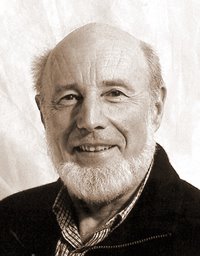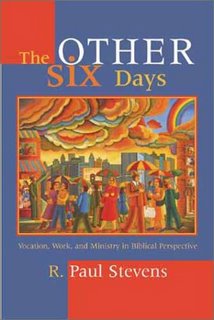 When Paul Stevens, retired marketplace theology professor in Regent, came to have a personal dialogue with iBridge leaders last month, he asked us if community and relationships alone would help our Headstart graduates to transition to the work place as disciples of Jesus...
When Paul Stevens, retired marketplace theology professor in Regent, came to have a personal dialogue with iBridge leaders last month, he asked us if community and relationships alone would help our Headstart graduates to transition to the work place as disciples of Jesus...To my mind, at least, we need to come together for mutual encouragement, but more than that, to some form of instructions as well on a biblical theology of our vocation.
He said that seminaries focus on theological-biblical studies while the laity are just immersed with their day-to-day work that there is a GAP in the middle connecting both... ie a theology of the marketplace.
For example, an understanding of arts, music, corporate governance, craftsmanship from biblical perspective.
When was the last time you heard a sermon on that? We can surely do more to empower the laity to 'minister' in their work place.
I also picked up these nuggets of wisdom... That we could do marketplace theology from top-down and bottoms-up.
Top-down approach : A full-time trained person could study the scriptures, draw out relevant principles to be applied to these different spheres of life
Bottoms-up approach is something close to what we try to do in Agora, people actually involved in the 'doing' to step back and reflect theologically on the matter.
Intersections of faith and work - Ethics (obvious one), spirituality (how is my faith expressed at work? Brother Lawrence?), mission (workplace as not only mission field, but work as participation in the missio Dei) and meaning (a sense of purpose and fulfilment).
He also encouraged me by telling a story of someone whose calling is to be an accomplished artist but made his living as a clerk or something.
 Here is an enligthening quote from his book The Other Six Days:
Here is an enligthening quote from his book The Other Six Days: We live in a post vocational age. Without any theology of vocation we lapse into debilitating alternatives: fatalism (doing what is required by 'the forces' and 'the powers')... karma (which ties performance to future rewards); nihilism (which denies that there is any good end to which the travail of history might lead); and the most common alternative today, self-actualization (in which we invent the meaning and purpose of our lives, making us magicians).
In contrast the biblical doctrine of vocation proposes that the whole of our lives finds meaning in relation to the sweet summons of a good God.
Comments
Shalom
Especially love Chapter 4 which talks abt vocation discernment.
While Paul Stevens' book is more for the academy and informed laity, Courage and Calling is more suited for group studies. Sometimes, we also use Marvin Wong's Between Friends for its localised and user friendly content
Shalom
When was the last time you heard a sermon on that? We can surely do more to empower the laity to 'minister' in their work place."
intereting thoughts! I agree... I think we need more than the usual "do your work and earn your money while at the same time reach out to your workmates by being a good testimony" sermons, and really go deeper into the theology of vocation!
I thot that is really engaging... maybe we can do one "Angst in the music of Linkin Park" or something